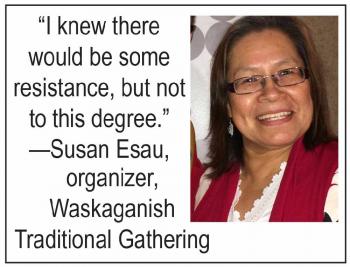By Shari Narine
Windspeaker.com Contributor
A referendum will not stop the first powwow to be held in Waskaganish Eeyou Nation (Quebec) in recent history.
“The referendum is unconstitutional in my belief,” said Susan Esau, organizer for the Waskaganish Traditional Gathering. “Having it, whether it’s for or against, we’re still planning on going ahead.”
Esau said the backlash she has received since announcing plans to host the powwow at the First Nation’s Reginald Hester Park from Sept. 21 to Sept. 23 has both “shocked and saddened” her.
“I knew there would be some resistance, but not to this degree,” she said.
A letter from the band council on Aug. 30 explained why a referendum on the powwow would be called.
“The Council has all the authority to decide on matters that occur within Category 1A lands, but as this matter is very important it is imperative that we hear from our people,” the letter reads.
Esau said she has heard that council met on Wednesday and approved a referendum. However, officials at the band office that Windspeaker.com spoke to would not confirm that nor offer any details on the logistics of such a referendum. Chief Darlene Cheechoo was not available for comment.
About 2,000 people call the Waskaganish Eeyou Nation in Quebec home. There are four churches—two Pentecostal, one Baptist and one Anglican—and a Catholic chapel in the community.
“Since in the ‘70s we had Pentecostalism coming into our community and it was very strong and they had many followers and based on their Christian values, any traditional ceremony or powwow was not acceptable,” said Esau.
But now it’s time, she said, as people have been asking for it. Powwows are held in the surrounding communities.
Derek McLeod, a member of the Waskaganish Eeyou Nation who does not live on reserve but has family members in the community, recorded a 15-and-a-half-minute message on Facebook as to why he opposed the powwow. He states that powwow is an Algonquin word meaning “the use of divination or practise of sorcery” and that the powwow “revered” and worshiped the drum.
“I’m coming at this from a biblical perspective,” said McLeod. “Divination and sorcery are two things the Lord does not look upon favourably…. To use divination or sorcery in any way is to basically rebel and basically to seek guidance from anyone or anything else than God himself.”
He also says that it is not enough for people not to attend the powwow. Hosting a powwow “stirs up the spirits.”
“Our lands are cursed because we fail to worship God,” said McLeod. “Ninety per cent of First Nations people across Canada and the United States do not worship the Lord. We are the most oppressed people upon this continent. We are. We are the most oppressed. We are the most depressed. We are the most possessed. And it’s all because we fail to worship the Lord God who would bring us out of these places.”
Esau says her people are battling Christian churches and generations of residential school teachings.
“I went to a residential school. I was told our ways are evil. They had all kinds of ways to make you believe that as an Aboriginal person you’re not worth much,” she said.
Esau made a presentation to the tri-council (youth council, Elders council and band council) about the powwow, calling it a gathering and a social event, with dancing and drumming and socializing. But still, those who spoke were not in favour of the powwow.
“I’ve been oppressed all my life. I went to school and there was racism and here I am sitting among my own people and I’m still oppressed. It’s a very sad situation,” she said.
What makes it worse, she said, is having the backing of the United Nations Declaration on the Rights of Indigenous Peoples, the Constitution, and Bill C-262 implementing UNDRIP in Canada, and yet not the support of her own people.
Despite the backlash the powwow has received, Esau is still hopeful. She looks at the cultural teachings, such as the walking-out, first snowshoe walk, and the first goose kill, which were revived under protest, but are now part of the community’s traditions. She knows families who are regularly practising their traditions. Her powwow committee is six members strong with even more community members volunteering to help at the event.
There are even more community members quietly supporting the powwow, silenced by intimidation. There is also support from the surrounding communities for the Waskaganish Traditional Gathering. She is optimistic that years down the road the powwow will be a community tradition.
“I just hope with what’s going on now, that our younger generation can feel that they don’t have to do this again, to fight for something that’s already part of us. I really hope we put this behind and learn from it and we live together in harmony with each other no matter what our different beliefs are,” she said.

